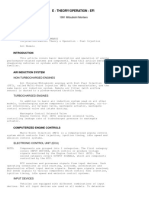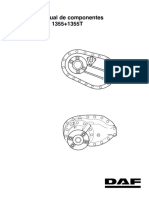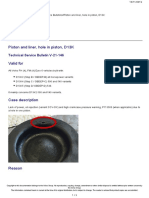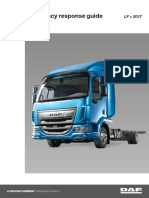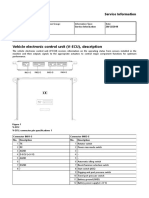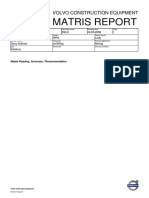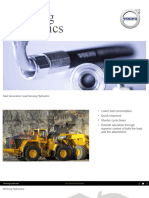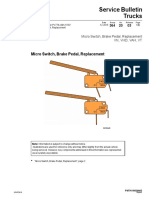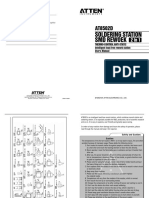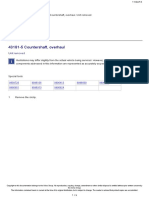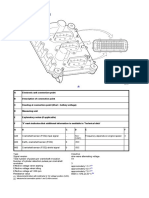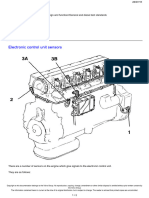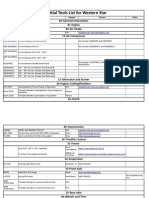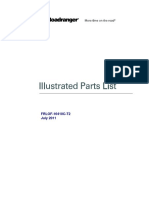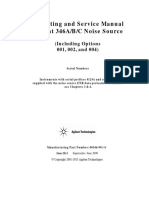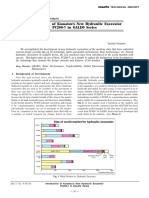Volvo Trucks North America
Greensboro, NC USA
This Service Bulletin replaces SB 260-32, “Cooling
System Service,” dated (1.2007), publication no.
PV776–20177193.
Cooling System, Pressure Test
D Date
Service Bulletin
10.2007
Trucks
Group
260
No.
48
Cooling System, Pressure Test
D16F
Page
1(7)
W2005772
This information covers the cooling system pressure testing on a chassis with the
Volvo D16F engine.
Contents
• “Special Tools” page 2
• “Cooling System, Pressure Test” page 3
Note: Information is subject to change without notice.
Illustrations are used for reference only and can differ slightly from the actual vehicle
being serviced. However, key components addressed in this information are
represented as accurately as possible.
PV776-20124506 USA27831.ihval
�Volvo Trucks North America
Service Bulletin
Special Tools
Tools
D Date
10.2007
For special tool ordering instructions, see tool information in group 08.
Group
260
No.
48
Page
2(7)
W0001795
C0000216
9996049 9996662
Coolant Drain Hose Pressure Gauge
�Volvo Trucks North America
Service Bulletin
D
Service Procedures
2609-06-02-01
Cooling System, Pressure Test
Date
10.2007
Group
260
No.
48
You must read and understand the precautions and
Page
3(7)
guidelines in Service Information, group 20, "General
Safety Practices, Engine" before performing these
procedures. If you are not properly trained and certified
in these procedures, ask your supervisor for training
before you perform the procedures.
Note: The preferred method for pressure testing
the cooling system is to use the DBT2V700 Coolant
Extractor. With the DBT2V700 hooked up to the vehicle,
a regulated pressure test can be performed using the
following procedure. If the DBT2V700 (or equivalent)
is unavailable, refer to the Pressure Testing Alternate
Method for pressure testing the cooling system.
Special tools: 9996049, 9996662
Pressure Testing with the DBT2V700 Coolant Extractor
Note: This procedure can be used to check for coolant
leaks around the liner packing
1
Remove the pressure cap on the expansion tank to
relieve cooling system pressure. Reinstall the cap.
CAUTION
When the engine is warm, open the pressure cap
slowly to avoid burns.
2
Add one gallon of water or coolant to the coolant extractor.
DBT2V700
�Volvo Trucks North America
Service Bulletin
D
3
Date
10.2007
Group
260
No.
48
Page
Hook the coolant extractor to the bottom of the radiator.
4(7)
W2005387
4
Check to make sure the pressure cap is tight.
5
Pressurize the coolant system to 13–18 psi.
W2005388
6
Inspect for coolant leaks around the radiator and at all
coolant pipe connections.
�Volvo Trucks North America
Service Bulletin
D
7
Date
10.2007
Group
260
No.
48
Remove the coolant extractor from the bottom of the
radiator.
Page
5(7)
W2005389
8
Repair any coolant leaks and repeat the above procedure
to check for additional leaks.
Pressure Testing Alternate Method
1
Remove the pressure cap on the expansion tank to
relieve cooling system pressure. Reinstall the cap.
CAUTION
When the engine is warm, open the pressure cap
slowly to avoid burns.
2
Install the test pressure gauge so that it is positioned
above the highest point in the cooling system. This
prevents coolant from running into the pressure gauge.
Use the drain hose to connect the pressure gauge to
the radiator drain plug.
9996662, 9996049
C2002713
�Volvo Trucks North America
Service Bulletin
D
3
Date
10.2007
Group
260
No.
48
Page
Unscrew the pressure regulator (2) counter clockwise to
6(7)
close it. Open the valve (1) of the pressure gauge to allow
compressed air into the cooling system.
W2002162
4
Slowly pressurize the cooling system by screwing in the
pressure regulator (2) to no greater than 40 kPa or 0.4
bar (6 psi). When the pressure stabilizes, check the
radiator, hoses, all coolant connections and coolant
pump for leaks.
T2007258
5
Increase the pressure in the system to approximately 3
psi (20 kPa or 0.2 bar) above the valve opening pressure
of the pressure cap on the expansion tank (check the
valve opening pressure in the Service Publications,
Group 20). Make sure the valve opens. At this pressure,
the air should continuously leak through the valve.
CAUTION
Perform this test for no longer than 10 seconds.
T2007257
�Volvo Trucks North America
Service Bulletin
D
6
Date
10.2007
Group
260
No.
48
When done performing the cooling system pressure
Page
test, disconnect the drain hose from the radiator with
7(7)
the system still pressurized. This prevents coolant from
entering the pressure gauge.
9996049
7
Disconnect the pressure gauge from the compressed
air source.
9996662
8
Repair any leaks as required.
9
Start the engine, check for leaks and proper operation.
After shutdown, replenish fluids as necessary.






